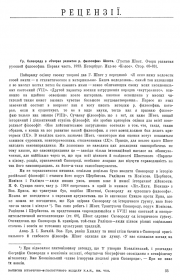H. Skovoroda in Shpet's ‘Ocherk razvitiya r. philosophii’ (Gustav Shpet. Essay on the Development of Russian Philosophy. First part. 1922. Petersburg. Kolos Publishing House. Pp. 68-83). In Notes of the Historical and Philological Department of the U.A.S., Book VIII, 1926, pp. 497-503
Keywords:
Ukrainian philosophy, Russian philosophy, Skovoroda studies, Kyiv-Mohyla AcademySynopsis
Viktor Petrov reviews the first part of Gustav Shpet's article ‘Essay on the Development of Russian Philosophy’, one of the key topics of which is the analysis of the philosophical views of Hryhorii Skovoroda, whom Shpet calls ‘a Russian philosopher’ and puts on a par with other Russian philosophers of the late nineteenth and early twentieth centuries - Mikhail Shcherbatov, Alexander Radishchev and Mykola Novikov. According to Petrov, such a comparison is groundless, as it ‘detaches Skovoroda from the historical soil’, and ‘Skovoroda and, [...], the same Radishchev are people of completely different social environments and not identical cultural traditions’ (p. 497). In addition, Petrov makes a number of methodological remarks to Shpet: 1) regarding ‘a consistent unwillingness to consider the historical perspective’ (p. 498), which is reflected in Shpet's partial and insufficient familiarity with the works of his contemporary Skovoroda scholars and leads to the chronological anachronism of Shpet's research; 2) the inability to distinguish between the real image of Skovoroda, which can be reconstructed from the primary sources of his works, and the image of the philosopher mythologised by the ‘literature about Skovoroda’, which entails the spread of widespread myths about Skovoroda, the most striking example of which is the repetition of the false thesis about Skovoroda's desire to ‘be a Russian Socrates’; 3) the absence of an comprehensive textual analysis of the entire scope of Skovoroda's texts in Shpet's research, which results in Shpet's misunderstanding of the key plots of this philosophy (for example, the difference between the concepts of ‘soul’ and ‘spirit’).
Vlada Davidenko
Downloads




